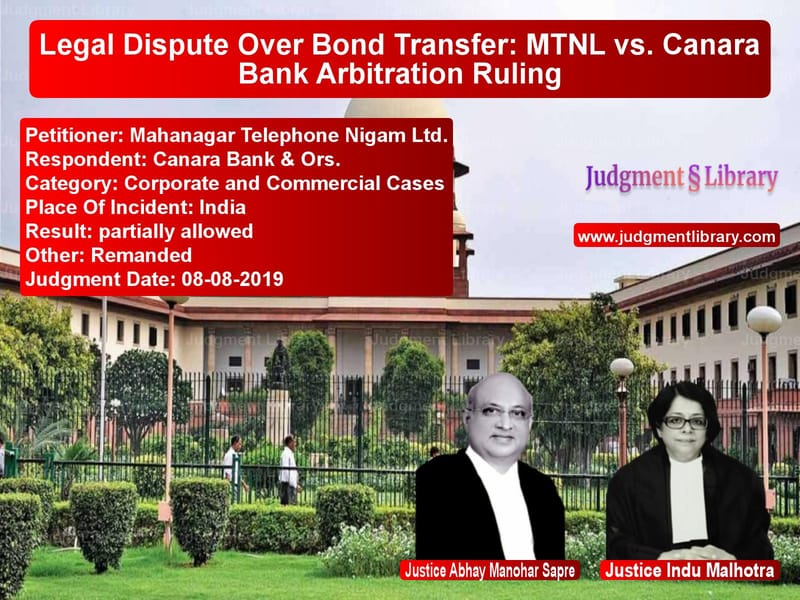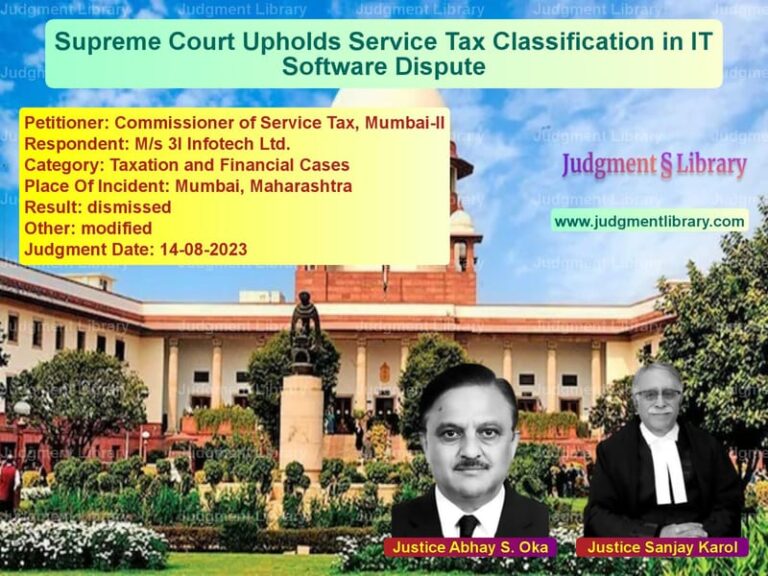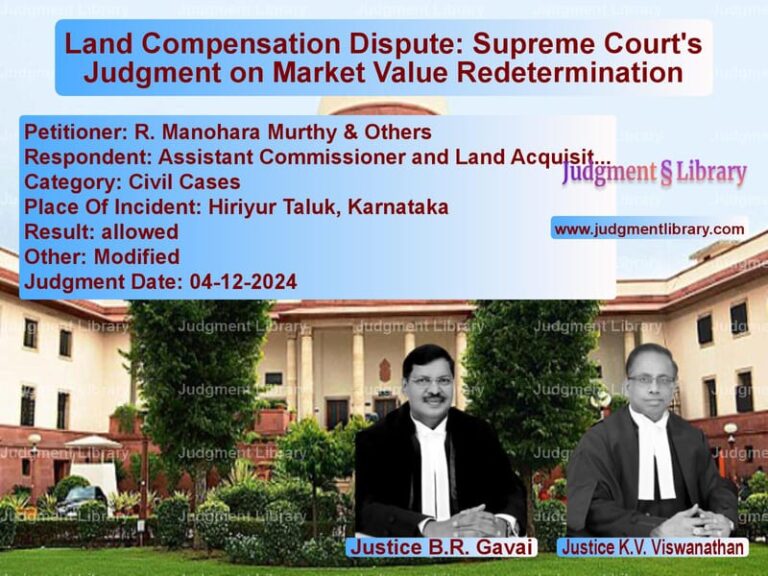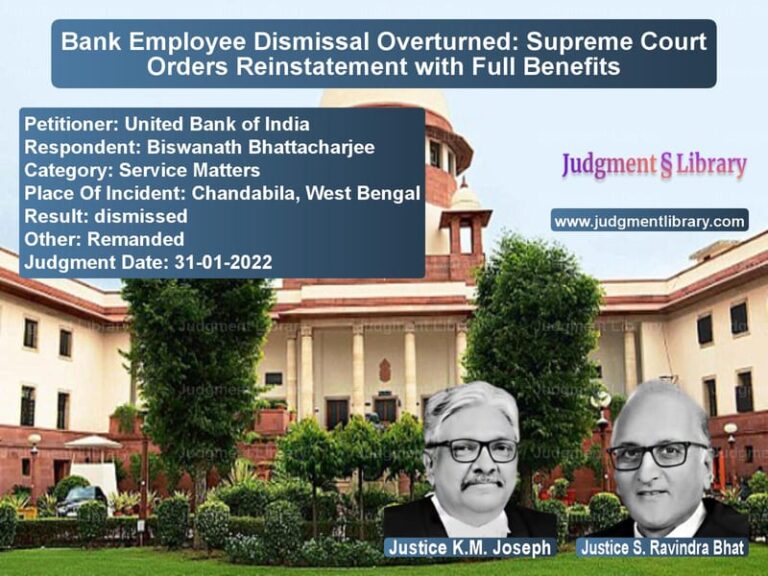Legal Dispute Over Bond Transfer: MTNL vs. Canara Bank Arbitration Ruling
The case of Mahanagar Telephone Nigam Ltd. (MTNL) vs. Canara Bank & Ors. revolved around a complex financial dispute concerning the issuance and transfer of bonds. The Supreme Court, in its judgment dated 8th August 2019, addressed whether an arbitration agreement existed between MTNL, Canara Bank, and CANFINA, and whether CANFINA should be included in the arbitration proceedings.
Background of the Case
In 1992, MTNL floated 17% Non-Cumulative Secured Redeemable Bonds worth Rs. 425 crores. Under a Memorandum of Understanding (MoU), it placed Rs. 200 crores worth of bonds with Can Bank Financial Services Ltd. (CANFINA), a wholly owned subsidiary of Canara Bank. However, CANFINA failed to pay back Rs. 150 crores along with interest to MTNL, leading to MTNL’s refusal to service the bonds.
Canara Bank, in the aftermath of a security scam that caused a collapse in the secondary market, purchased Rs. 80 crores worth of these bonds from CANFINA and requested their registration. MTNL refused, leading to a prolonged legal battle.
Key Arguments by the Petitioner (MTNL)
- MTNL contended that there was no valid arbitration agreement between MTNL, Canara Bank, and CANFINA as required under Section 7 of the Arbitration and Conciliation Act, 1996.
- MTNL argued that the arbitration process could not proceed in the absence of CANFINA, as it was the original purchaser of the bonds.
- It claimed that there was no privity of contract between MTNL and Canara Bank because the disputed bonds were initially bought by CANFINA.
- MTNL insisted that arbitration could only occur if all three parties were included, as the dispute was interlinked between them.
Key Arguments by the Respondent (Canara Bank)
- Canara Bank contended that MTNL had already submitted itself to arbitration and could not challenge its validity at this stage.
- It argued that CANFINA was merely a proforma party in the original proceedings and should not be included in the arbitration.
- Canara Bank maintained that MTNL had filed its claim and counterclaim in arbitration, thereby acknowledging the process.
- The bank opposed the inclusion of CANFINA, asserting that it was not a necessary party to the dispute.
Supreme Court’s Observations
The Court examined the legal principles concerning arbitration agreements, referring to Section 7 of the Arbitration and Conciliation Act, which defines an arbitration agreement as a written agreement between parties to submit disputes to arbitration.
The Court emphasized that an arbitration agreement does not need to be in a specific form but must reflect the parties’ intention to resolve disputes through arbitration.
1. Validity of the Arbitration Agreement
The Court noted that:
- The agreement between MTNL and Canara Bank to arbitrate was evident from various exchanged documents and judicial proceedings.
- MTNL had previously consented to arbitration in the Delhi High Court proceedings.
- Section 7(4)(c) allows an arbitration agreement to be inferred from statements of claim and defense if the existence of the agreement is asserted by one party and not denied by the other.
2. Inclusion of CANFINA in the Arbitration Proceedings
The Court invoked the Group of Companies Doctrine, which allows non-signatory affiliates to be bound by arbitration agreements if they are integral to the dispute. It stated:
“A non-signatory may be bound by an arbitration agreement where the parent or holding company, or a member of the group of companies, has participated in the contract’s negotiation, performance, or termination.”
It found that CANFINA, a wholly owned subsidiary of Canara Bank, played a crucial role in the bond transaction. The Court ruled that without CANFINA’s inclusion, the arbitration would be ineffective in resolving the dispute.
3. Enforcement of the Arbitration Agreement
The Court reaffirmed that once parties have agreed to arbitration and participated in proceedings, they cannot later contest the validity of the arbitration agreement. It cited Redfern and Hunter on International Arbitration, which states that courts should interpret arbitration agreements to give effect to the parties’ intentions rather than invalidate them on technicalities.
Final Verdict
- The Supreme Court ruled that the arbitration agreement was valid and binding between MTNL, Canara Bank, and CANFINA.
- It ordered the arbitration proceedings to continue with all three parties involved.
- The Court referred the matter back to the sole arbitrator, Justice A.P. Shah (Retd.), directing a swift resolution of the dispute.
Implications of the Judgment
- The ruling clarifies that arbitration agreements do not have to follow a strict format but must reflect a clear intent to resolve disputes through arbitration.
- It upholds the Group of Companies Doctrine, ensuring that subsidiaries and affiliates cannot escape arbitration if they are integral to the transaction.
- The decision reinforces the principle that parties cannot challenge arbitration agreements after having voluntarily participated in the process.
Conclusion
The Supreme Court’s judgment in this case reaffirms the importance of arbitration in resolving commercial disputes efficiently. By invoking the Group of Companies Doctrine, the Court ensured that all relevant parties were included in the arbitration process, preventing fragmented litigation. The ruling sets a precedent for future arbitration cases involving complex corporate structures, emphasizing the need for a holistic approach in dispute resolution.
Petitioner Name: Mahanagar Telephone Nigam Ltd..Respondent Name: Canara Bank & Ors..Judgment By: Justice Abhay Manohar Sapre, Justice Indu Malhotra.Place Of Incident: India.Judgment Date: 08-08-2019.
Don’t miss out on the full details! Download the complete judgment in PDF format below and gain valuable insights instantly!
Download Judgment: Mahanagar Telephone vs Canara Bank & Ors. Supreme Court of India Judgment Dated 08-08-2019.pdf
Direct Downlaod Judgment: Direct downlaod this Judgment
See all petitions in Company Law
See all petitions in Judgment by Abhay Manohar Sapre
See all petitions in Judgment by Indu Malhotra
See all petitions in partially allowed
See all petitions in Remanded
See all petitions in supreme court of India judgments August 2019
See all petitions in 2019 judgments
See all posts in Corporate and Commercial Cases Category
See all allowed petitions in Corporate and Commercial Cases Category
See all Dismissed petitions in Corporate and Commercial Cases Category
See all partially allowed petitions in Corporate and Commercial Cases Category







